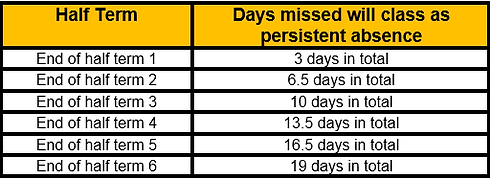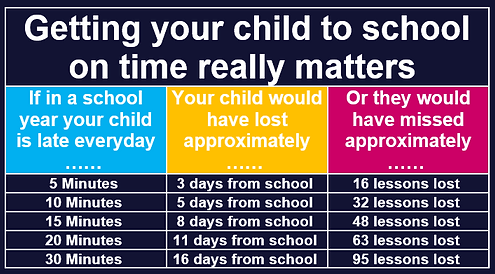
Attendance
At De La Salle we are conscious of the relationship between good attendance, effective learning, and outstanding academic progress. Research shows attendance is directly related to academic progress - the higher the attendance of a student, the higher their GCSE grades at the end of Year 11. Attendance above 95% every year in school averages one grade difference across all GCSE grades and increases the chances of students achieving a grade 4 or higher in English and maths. We expect all our learners to aim for 100% attendance as we know that learners with high aspiration and attendance go on to achieve better outcomes and live healthier, wealthier, and more enriched lives.
Students with less than 95% attendance are less likely to achieve those important GCSE grades. Additionally, setting high expectations is useful preparation for each student's life beyond school and the important skill of reliability which all settings require.

If a learner does not attend school, or is not taking part in an approved educational activity, they are classed as ABSENT from school. This means that if your child is off school for any reason, even if they are ill or have medical permission to be off school, they are classed as ABSENT. Missing lessons leaves students vulnerable to falling behind, creating gaps in their learning and lowering their self-confidence.
** Please note that if an absence is authorised attendance % is still affected.
How can you help?
We ask for the support of our parents/carers in supporting good attendance by:
- Promote positive and healthy attendance patterns with your child and set good bedtime and morning routines.
- Ensure your child attends every day, on time and equipped and ready to learn.
- Ensure school has at least 3 up to date addresses and contact numbers.
- Contact School on the first day of absence by 08.30am to provide a reason for absence.
- Contact the school each day of absence until your child returns.
- If contact is not made the absence will be recorded as unauthorised. The school is responsible for deciding if the absence is acceptable or not.
- Provide medical evidence for any absence exceeding 5 days (10 sessions) or more.
- Ensure medical appointments are made outside of school time. If this is not possible, your child needs to be in school prior to and after the appointment. We will need medical evidence upon their return.
- Holiday requests during term time will not be authorised due to the significant impact on progress. Parents/carers who take their children out of school for a holiday may be issued with a Penalty Notice.
- Contact school if you are experiencing difficulty getting your child to attend school.
Work with the school and any other agencies of support to resolve any difficulties which may affect regular school attendance.

What is classed as persistent absence?
Persistent Absence is classed as any absence that equates to over 10% of the academic year at any given time. Any learner who appears on the persistent absence list may be monitored. The thresholds are set out below:

School Support System
Please note that 90% on a test is seen as a positive achievement, but in attendance terms anything less than 90% is a serious concern. You should be striving for 100% attendance each year.

We need to work collaboratively with students, home and local partners to promote and support positive attendance. We will work with all partners to:
- Rigorously use attendance data to identify patterns of poor attendance (at individual and cohort level) as soon as possible so all parties can work together to resolve them before they become entrenched
- Aspire to high standards of attendance from all pupils and parents and build a culture where all can, and want to, be in school and ready to learn by prioritising attendance improvement across the school. Parental expectation to monitor attendance on Edulink and support school with strategies to reduce absence
- When a pattern is spotted, discuss with pupils and parents to listen to understand barriers to attendance and agree how all partners can work together to resolve them
- Remove barriers in school and help pupils and parents to access the support they need to overcome the barriers outside of school. This might include an early help or whole family plan where absence is a symptom of wider issues
- Where absence persists and voluntary support is not working or not being engaged with, partners should work together to explain the consequences clearly and ensure support is also in place to enable families to respond. Depending on the circumstances this may include formalising support through a parenting contract or education supervision order
- Where all other avenues have been exhausted and support is not working or not being engaged with, enforce attendance through statutory intervention or prosecution to protect the pupil’s right to an education
Attendance Support Team
We have a dedicated team of staff at De La Salle School who work on Attendance; the Attendance Officer, Pastoral Support Managers and Heads of Year scrutinise our attendance data daily and work closely with St Helens Education Welfare Services.
As you would expect, we have very high standards and are committed to all our students making maximum progress. The attendance staff are always happy to offer advice and support to students, parents and families on effective strategies for maximising attendance. If you would like more details please do not hesitate to contact school.
Further details can be found in the school's Attendance Policy.
IT IS VITAL THAT YOU KEEP US INFORMED IF YOUR CONTACT DETAILS CHANGE SO THAT WE CAN STAY IN TOUCH WITH ALL PARENTS ON A REGULAR BASIS.
Punctuality

There is a clear link between attendance and punctuality and attainment. The more time a pupil spends in school the more likely they are to improve their opportunity to fulfil their full potential.
How can you help!
Ensure your child is at school and ready to learn before 8.30am each day.
Students should be in their form room ready for form time that begins at 08.30am.
Make sure school bags are packed the night before and that your child gets up with plenty of time to eat and get ready.
Being late doesn’t only affect your child, it disrupts other children in the class as well as the teachers trying to teach a lesson. However, if you do think you are going to be late, please do not keep your child off school for the rest of the day. Being late and in school is better than being absent and missing out. If your child is late for a genuine, unavoidable reason please phone the school office.
Punctuality to lessons is also extremely important. The start of a lesson is when important recall activities take place to ensure learning gaps are filled.
The Law
A school has to take a register of all pupils first thing in the morning and sometime during the afternoon. The Government allows schools to decide how long the registers will remain open, this is generally around 30 minutes, however this may be for a shorter period.
If a pupil arrives late to school but whilst the register is still open, they are marked as late (L on the attendance register). We believe that teaching students, the vital skill of reliability is important for them to achieve their full potential in school but also to support them for the wider world where punctuality is very important for employers and further education settings.
If a pupil arrives at school after the register has closed, without a satisfactory reason, this may be classed as an unauthorised absence (U code on the attendance register) and may lead to prosecution for not ensuring your child has regular school attendance.


